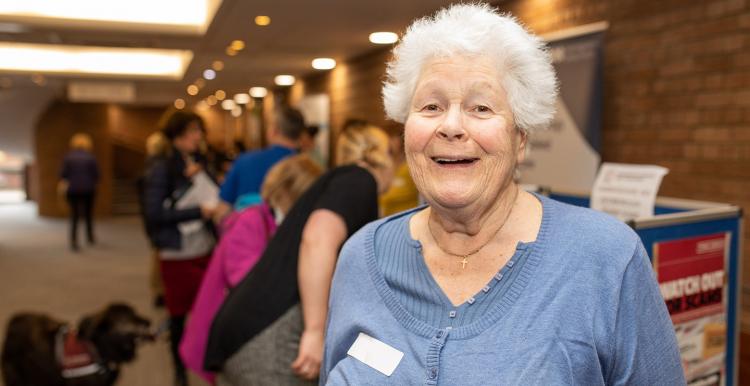Commissioners answer your questions about the new Integrated Care System

What are Integrated Care Systems?
Integrated Care Systems are a new form of partnership that bring together providers and commissioners of NHS services across a geographical area (in our case Barnet, Camden, Enfield, Haringey, and Islington) with local authorities and other local partners to collectively plan health and care services to meet the needs of their population. From April next year, Integrated Care Systems will become fully operational as statutory organisations responsible for strategic commissioning.
It is hoped that the introduction of Integrated Care Systems will:
- support greater integration of health and care services
- improve population health and reduce inequalities
- support productivity and sustainability of services
- help the NHS to support social and economic development in the local area.
Find out more about the development of the Integrated Care System for North Central London (read the presentation shared with the Islington Patient Group)
This doesn’t feel new. We’ve seen many new commissioning structures introduced over the years but the central problems remain. There’s inadequate funding.
Questions from the audience
My question is about GP practices. We haven’t heard about the role of GP practices in the Integrated Care System. How have they been involved and how will they be affected?
They have been involved via the five Primary Care Networks (PCNs). GP practices have grouped into clusters based around locality. There are two in the north, two central, and one in the south of the borough. Each have a clinical director, who is generally a GP but in the south the director is a practice manager.
There’s lots of pressure on GP practices. One of our focuses will be looking at how we can support them. There is primary care representation throughout this system.
One of the slides was titled: ‘What people will get’ and it said, ‘I will get more of my care outside hospital’. Can you give examples of new approaches that won’t represent a deterioration of the existing service?
- This new legislation will mean the NHS moves away from the current way of planning and paying for healthcare. In the current system, NHS hospitals were encouraged to compete with each other to provide the best care possible. This improved quality, but has meant it is harder to move money to prioritise prevention. The new way of working will support more collaboration and joint-planning between NHS organisations with the aim of both improving quality and investing in preventative and proactive care.
- Hospital involvement will bring a strong focus on prevention.
- If you need to see a specialist, the GP can email on your behalf for advice and guidance rather than you having to wait for an outpatient appointment. GP and hospital services will be better integrated so consultant input can be more easily accessed by the GP. This doesn’t mean that a hospital consultant is coming out of the hospital to see individual patients. The GP can follow this action plan from the practice.
- There will be better capacity to engage consultants in community care
- Diagnostic services and health prevention services will be delivered closer to home.
- Organisations have been brought together by the pandemic to deliver the immunisation programme. For example, we’ve seen the GP federation working with the local authority and UCLH with the Business Design Centre. The Integrated Care System will make it easier to extend this approach to other clinical areas.
Before Covid, I had a fabulous relationship with my GP but since the pandemic it has been difficult to get an appointment. When might that change?
We need to understand what is happening in each of our practices. GPs are offering 10% more appointments (sometimes 20%) than they did pre-Covid. Fifty per cent of all appointments being offered now are face-to-face. Many people find the use of telephone or video consultations helpful and this will need to continue to help us manage some of the demand we are seeing at the moment. General practice has been underfunded in the past, relative to other services, which has caused some of these issues around access. However, we can use practice nurses and pharmacists to deliver the right care in practices. It doesn’t always have to be the GP you see.
On the other hand, if we hear that doors are closed we need to understand why that is. It may be that these are single-handed practitioners, who are working from cramped premises, where they are concerned about ongoing risks to staff from Covid. We need a combination of hard data and soft intelligence to understand what’s going on.
There are certainly infrastructure problems in general practice with regards to telephony, and problems with absence in reception staff. Remote appointments don’t suit everyone. We are committed to improving access. We have a weekly sitrep (situation report) to understand the problems practices are facing so we can respond.
We will need to get resources and capacity to support GPs to improve their practices. Feedback from Healthwatch has been very helpful and we act on what we’ve learned to make sure practices update telephone messages and websites with up to date information. We’re working with Healthwatch and PPGs (Patient Participation Groups) to understand different areas. It’s high up on our agenda.
The statistic you quoted of 50% face-to-face. Can I query that? I’m a frequent user of GP services. I have multiple co-morbidities and am in my practice 30 to 50 times a year. I can see from waiting rooms that numbers are hugely down and many people are complaining. I noticed that on my GP app some of my test results are being recorded as consultations so I wonder about how some of these GP interactions are being described and counted.
We can review the accuracy of the data. Waiting rooms will be quieter as there are measures in place to prevent waiting and overcrowding.
With regard to GP access: When you say 50% face-to-face would that include video appointments such as on Microsoft Teams?
The 50% face-to-face number does not include virtual consultations. When we refer to face-to-face appointments we are referring to people physically being in the room.
The percentage refers to the number of people who are actually being given face-to-face appointments, not the number of people who request them. Most practices are now starting to offer face-to-face appointments routinely to those who want them. Patients should always ask if this is the preferred way they would like to have their consultations.
If your experience of GP access has been different through the pandemic Healthwatch is interested in hearing your views.
How can voluntary sector organisations support the Integrated Care System and who will provide training? How will budgets be divided?
The Integrated Care System will see a much more diverse team giving people care, including voluntary sector groups. We are talking to the voluntary sector about the support that is needed.
There will be social prescribers, community liaisons, and other new emerging roles. We are trying to ensure that these are less clinically specific and broader. We don’t have all the answers yet and much of this will be co-designed and based on what people say they need.
The system is changing. One question we’re asking is how do we get different services to do training together? The mental health trust is including the voluntary sector (MIND) in their training, so it’s not just doctors learning together. We’re looking for opportunities to integrate sectors through training, and joint induction sessions.
Each organisation is putting in place specific health and wellbeing measures for their staff. Our mental health trusts have been supporting across the sector as well.
Will this mean more funding going to local voluntary and community organisations (VCS) and away from the NHS?
It may mean that the NHS buys more services from the VCS. For example, we buy navigation services from different parts of the VCS.
There was mention of consultants going into GP practices to work on paediatrics and maybe patients of all ages. In my experience, consultant-led hospital services were better during the pandemic. It’s no longer as easy to speak to the consultant directly. I’ve found it difficult to get my story across. The experience feels mechanical. I’ve had no feedback and been given an appointment in a year’s time. If consultants can’t manage their own lists how can they go out into communities as well?
Consultants have always worked in teams. You don’t always get to speak to them directly. Other staff/nurses in their teams do support the delivery of the services they give. As we get older and our health conditions become more complex, sometimes it’s important that you are able to speak to the senior person. A tick box approach wouldn’t then be appropriate. Digital interactions can help manage the burden on consultant teams in managing their caseloads effectively. But they mustn’t replace face-to-face appointments. Equally, if the opinion of the senior consultant is required, more junior staff can request this.
In mental health services we already have consultants coming into practices and this has been a very effective way to deliver care. There are other ways to bring senior clinical support into the community; through multi-disciplinary team conversations, whilst enabling consultants to manage the backlog of patients needing to be seen in hospital as well.
People are waiting longer, but a senior GP can help by working in collaboration with the consultant. It’s about knitting things together. The GP will be able to speak to the consultant more quickly and easily and three-way conversations may be possible that involve the patient as well.
This doesn’t feel new. We’ve seen many new commissioning structures introduced over the years but the central problems remain. There’s inadequate funding. Regardless of what’s introduced, it always boils down to the NHS and the local authority arguing about who’s going to spend whose money on what.
- The NHS and Local Authorities need to be equals in the provision of health and care services to residents. From an Islington perspective, we are proud of how the NHS and the council have worked together. There is lots of pressure on the system but there’s recognition that there is one set of residents we need to care for together.
- The removal of the purchaser/provider split will help. [In the past there was more emphasis on encouraging competition, and separation between commissioners and providers. The new model places greater emphasis on collaboration.]
- The vaccine programme saw our people working in a very different way. We think we have a real opportunity locally. The acid test will be whether we are able to shift the capacity and resource into primary and social care as well as mental health services, in a way we have not done before.
Have patients really seen the changing links between professionals? For example, you mention pharmacists in GP practices. But this happened before the pandemic and has changed with the use of telephone appointments.
We did already have pharmacists and our primary care networks are looking at recruiting some different professionals like paramedics and physios. These will work across primary care and also community services and are aiming to provide more tailored care
Alongside all the positive ambitions of the speakers, must be a concern that the ‘Covid’ practices become institutionalised. For example, telephone calls remain the norm. It is a filtered form of communication that is limited in creating empathy.
We are also doing lots of work, (including with Healthwatch) to ensure people aren't digitally excluded. We need to ensure the provision of face-to-face appointments for people when they require them. We will also need to consider how the digital offer can be best utilised as this can help streamline services for those whose query can be managed by alternative means.


